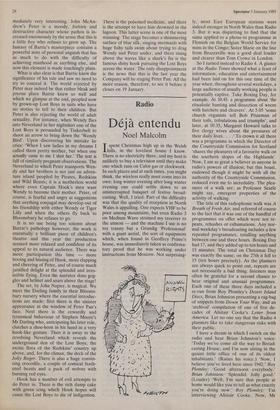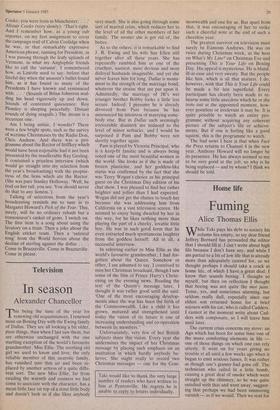Radio
Deja entendu
Noel Malcolm
T spent Christmas high up in the Welsh in the loveliest house I know. There is no electricity there, and my host is unlikely to buy a television until they make one which runs on Calor gas or clockwork. In such places and at such times, you might think, the wireless really must come into its own: long winter evening after long winter evening one could settle down to an uninterrupted banquet of festive broad- casting. Well, I tried. Part of the difficulty was that the quality of reception in North Wales is appalling. One expects VHF to be poor among mountains, but even Radio 3 on Medium Wave strained my receiver to the utmost — and the machine I use is no toy tranny but a Grundig 'Professional' with a giant aerial, the sort of equipment which, when found in Geoffrey Prime's house, was immediately taken as confirma- tory proof that he was working under instructions from Moscow. Not surprising- ly, most East European stations were indeed stronger in North Wales than Radio 3. But it was dispiriting to find that the same applied to a phone-in programme in Flemish on the Belgian World Service for nuns in the Congo; Sister Marie on the line from Brazzaville was a good deal louder and clearer than Tom Crowe in London.
So I turned instead to Radio 4. A glance at the Radio Times showed what a feast of information, education and entertainment had been laid on for this one time of the year when, throughout several weekdays, a large audience of usually working people is potentially captive. Take Boxing Day, for example. At 10.45: a programme about 'the ritualistic hunting and dissection of wrens with hatchets and cleavers'. At 5.05 'some church organists tell Bob Prizeman of their toils, tribulations and triumphs', and later, at 10.35, Margaret Howard talks to five clergy wives about the pressures of their daily lives. . . .' To crown it all there was a programme in which the Director of the Countryside Commission for Scotland 'shares the pleasures of a favourite walk on the southern slopes of the Highlands'. 'Now, I am as great a believer as anyone in radio's powers of illusion; but this boast, endowed though it might be with all the authority of the Countryside Commission, reduced even me to incredulity. The plea- sures of a walk are, as Professor Searle might say, emergent properties of the activity of walking.
The title of this radiophonic walk was A Breath of Fresh Air, and referred of course to the fact that it was one of the handful of programmes on offer which were not re- peats, rehashes or exhumations. Any nor- mal weekday's broadcasting includes a few repeated programmes, totalling anything between one and three hours. Boxing Day had 17, and they added up to ten hours and 15 minutes. The total on Christmas Day was exactly the same; on the 27th it fell to 15 (ten hours precisely). As the planners are always quick to point out, repeats are not necessarily a bad thing: listeners may often be grateful for a second chance to hear original and unusual programmes. Each one of these three days included a re-run from Roy Plomley's Desert Island Discs, Brian Johnston presenting a rag-bag of snippets from Down Your Way, and an 'archival' compilation of one of five de- cades of Alistair Cooke's Letter from America. Let no one say that the Radio 4 planners like to take dangerous risks with their public.
I have a dream in which I switch on the radio and hear Brian Johnston's voice: 'Today we've come all the way to Broad- casting House, and I'm now sitting in the quaint little office of one of its oldest inhabitants.' (Raises his voice.) 'Now, I believe you've lived here since 1942.' Roy Plomley: 'Good afternoon everybody.' Brian Johnston: 'Splendid. Jolly good.' (Louder) 'Well, I'm sure that people at home would like you to tell us what exactly you're doing now.' Roy Plomley: `I'm interviewing Alistair Cooke. Now, Mr Cooke, you were born in Manchester. . . Alistair Cooke (very slowly): 'That's right. And I remember how, as a young cub
reporter, on my first assignment to cover the campaign trail of Calvin Coolidge when he was, in that remarkably expressive American phrase, running for President, as I was passing through the leafy uplands of Vermont, in what my Anglophile friends
like to call the 'autumn', I remembered how, as Lincoln used to say, before that
fateful day when the assassin's bullet found him, as it has found so many of the Presidents I have known and reminisced With. . (Sounds of Brian Johnston nod- ding his head vigorously up and down. Sounds of contented quiescence: Roy Plomley is sleeping peacefully. Distant sounds of dying seagulls.) The dream is a recurrent one.
Am I being unfair, I wonder? There were a few bright spots, such as the survey of wartime Christmases by the Radio Don, Chris Andrew. And there was a pro- gramme about the Rector of Stiffkey which would have been enjoyable had it not been presented by the insufferable Ray Gosling. It contained a priceless interview (which would go straight into my selection from the year's broadcasting) with the proprie- tress of the lions which ate the Rector.
(She was pure Stanley Holloway. 'Well, he trod on her tail, you see. You should never do that to any lioness.')
Talking of selections from the year's broadcasting reminds me to tune in to
Margaret Howard's Pick of the Year. This,
surely, will be no ordinary rehash but a connoisseur's casket of gems. I switch on.
The first item is a song about using the lavatory on a train. Then a joke about the English cricket team. Then a 'satirical song' from the World Service about the decline of sterling against the dollar . . . . Come in Brazzaville. Come in Brazzaville. Come in please.







































 Previous page
Previous page